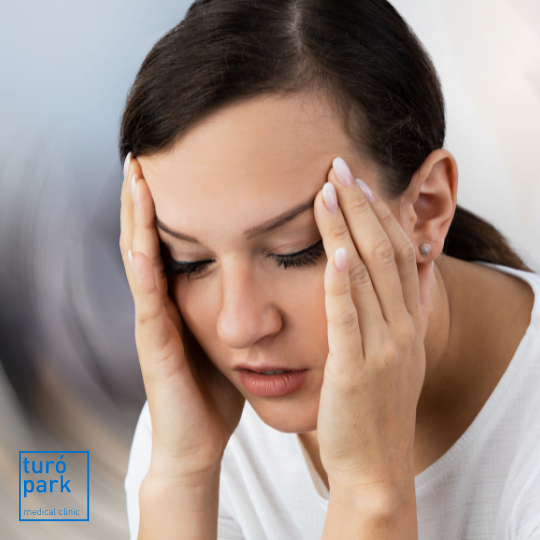Are you suffering from vertigo, dizziness or imbalance and are you looking for an English-speaking physiotherapist in Barcelona?
Dizziness is a very common sensation of rotation in our environment. When it is similar to a simple dizziness that lasts only a few seconds, don't panic: it is generally benign.
But if you have persistent or recurrent sensations of imbalance and head spinning, or difficulty standing upright, you should know that these ailments can be relieved and treated by our physiotherapists specialising in vertigo and vestibular rehabilitation.
So don't wait to make an appointment with one of our specialists.
Fast track your treatment
To book an appointment or speak with one of our friendly team, please get in touch using the options below.

What is vestibular kinetics?
Normally, the vestibular system helps us to maintain our balance, in association with our sight and proprioceptive sensitivity (sensation of our body's position in space). But sometimes this system does not work properly resulting in conflicts of different information received by our brain.
Vestibular rehabilitation is a speciality of physiotherapy dedicated to the treatment of patients suffering from pathologies of the vestibular system.
These pathologies usually result in vertigo and other symptoms such as sweating, nausea and vomiting.
Vestibular rehabilitation is the repeated practice of certain activities or movements that cause mild dizziness symptoms and or unsteadiness. This regular training can allow the brain and body to adapt to a chronic dizziness problem or recover from acute vestibular damage.
It utilises neural plasticity, the ability of the brain to adapt itself, to promote stronger neural connections within the brain to better deal with vestibular information.
What causes vertigo?
Several pathologies can cause vertigo:
- Vestibular syndrome
- Vestibular neuritis
- Meniere's disease
- Benign paroxysmal positional vertigo (BPPV)
- Acoustic neuroma
- Head trauma
In order to diagnose these diseases, the patient must first complete a comprehensive interview. Particular attention is paid to the limitations to the patient's daily life that result from vertigo.
An otorhinolaryngological examination, i.e. of the ears, nasal cavities, mouth and throat (pharynx and larynx) is also carried out afterwards.
If necessary, other examinations may be carried out:
- A neurological examination
- Audiometry or hearing function study
- A complete computerised vestibular test
- MRI or CT scan
Healthy Body, Healthy Mind!
Our English-speaking physiotherapists welcome you for the treatment of your pain and the rehabilitation of your injuries.

What does vestibular rehabilitation consist of?
Depending on the pathology and the patient's condition, the physiotherapist will propose an personalised and adapted vestibular re-education plan based on the diagnostic assessment.
A session varies on average between 15 and 30 minutes and the treatment can last from 4 to 10 weeks. The length of time depends mainly on the pathology, the stage of the rehabilitation and the patient's feelings.
In the case of benign paroxysmal positional vertigo, the role of the physiotherapist specialised in vertigo and vestibular rehabilitation is to evacuate small crystals in the utricular macula by carrying out a so-called therapeutic or liberating manoeuvre.
For other pathologies, the physiotherapist uses equipment such as videonystagmoscopy, the rotatory chair or static and dynamic posturography platforms in order to "re-weight" the patient's sensory inputs.
Therefore, vestibular rehabilitation aims to obtain central compensation for a vestibular deficit, whether uni or bilateral, complete or partial.
What can you expect from vestibular rehabilitation at Turó Park Medical Clinic?
Vestibular rehabilitation sessions will improve the patient's quality of life by:
- Reducing the frequency, duration and intensity of vertigo;
- Reducing the symptoms that are generally associated with it, such as nausea, vomiting, headaches, etc.;
- Improving independence in everyday activities.
However, it is essential that the patient carries out the recommended exercises given by the physiotherapist between the in-clinic sessions.
Our English-speaking physiotherapist specialising in vestibular rehabilitation
